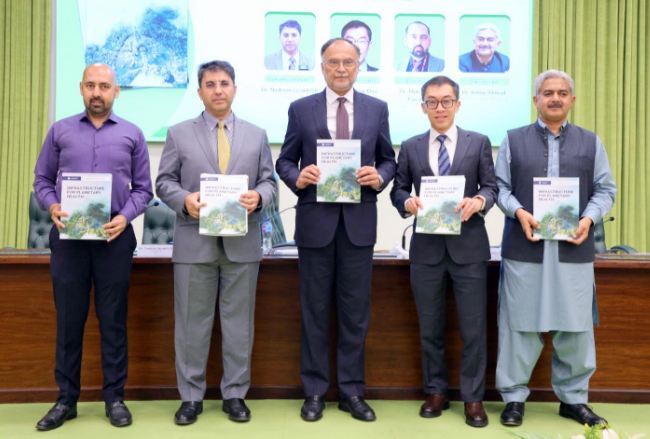ISLAMABAD, MAY 27 /DNA/ – In a powerful call for climate-conscious development, the Pakistan Institute of Development Economics (PIDE) and the Asian Infrastructure Investment Bank (AIIB) jointly unveiled the Asian Infrastructure Finance 2025 report under the theme “Infrastructure for Planetary Health.” The launch was marked by a high-level conference in Islamabad, bringing together policymakers, economists, development partners, and climate experts for a deep dive into solutions for building resilient, sustainable infrastructure.
The event, themed “Building Climate-Resilient Infrastructure: Lessons and Way Forward,” sounded an urgent alarm: infrastructure must evolve—not just to fuel growth, but to protect the health of people and the planet.
A Wake-Up Call from Ground Zero
Welcoming participants, Dr. Nadeem Javaid, Vice Chancellor of PIDE, reflected on the stark reality Pakistan faces. “The 2022 floods were a national catastrophe—$32 billion in losses, two decades of development washed away, and over six million pushed into poverty,” he said. “Climate change is not tomorrow’s threat—it is today’s crisis.”
Dr. Javaid emphasized that environmental degradation, inadequate water storage, and climate-vulnerable agriculture are compounding risks that must be addressed through collective action and long-term planning.
Minister Ahsan Iqbal: A New Infrastructure Paradigm
Federal Minister for Planning, Development & Special Initiatives, Prof. Ahsan Iqbal, congratulated PIDE and AIIB on their strategic partnership and issued a resounding call for change.
“We must build infrastructure that doesn’t just deliver growth—but ensures survival,” Prof. Iqbal declared. He outlined the government’s bold steps under the 5Es framework, including the deployment of zero-emission electric buses, restoration of flood-prone riverbanks, and climate-proofing healthcare facilities.
Calling for a paradigm shift, the Minister underscored that at the Planning Commission, no project is now cleared unless it fully incorporates climate resilience, environmental sustainability, and updated building codes. “This is our new standard,” he stated. “The cost of inaction—whether through lives lost, health crises, or economic setbacks—is far greater than the investment required for green, future-proof solutions.”
To close the climate finance gap, Prof. Iqbal advocated the use of green bonds, resilience bonds, and public-private partnerships, stressing the importance of mobilizing both domestic and international capital.
Human Capital for a Greener Future
Equally important, the Minister stressed the need to invest in climate-literate professionals—engineers, planners, architects, and economists who can design a future-proof Pakistan. He acknowledged PIDE and AIIB’s thought leadership and urged sustained collaboration to embed climate resilience into national policy frameworks.
AIIB Report: Infrastructure and Health—A Tied Destiny
Presenting the flagship report, Dr. Jang Ping Thia, Lead Economist at AIIB, revealed a sobering link between weak infrastructure and worsening health outcomes in Asia. He highlighted that climate change magnifies inequalities, disproportionately affecting low-income and marginalized communities.
“We must start treating nature as infrastructure,” he emphasized, showcasing examples of wetland restoration, urban green buffers, and nature-based solutions that are not only cost-effective but essential for public health and economic resilience.
Charting the Path Forward
The conference concluded with an expert panel featuring Dr. Imtiaz Ahmad, Chief Economist at the Ministry of Planning; Dr. Muhammad Faisal, Research Fellow at PIDE; and others. They stressed the urgency of integrating climate risk into infrastructure planning, scaling green finance, and embracing adaptive agriculture and resilient urban development.
Closing the conference, Dr. Shujaat Farooq, Director of Research at PIDE, issued a final rallying cry: “This is more than a development agenda—it’s a survival strategy. Every policy decision we make today will shape the wellbeing of future generations.”

















